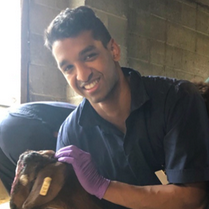Engineering and Design of Feline Cell-Based Immunotherapies
Feline infectious peritonitis (FIP) is an invariably fatal disease in cats caused by a mutated version of feline coronavirus (FCoV). Although there is an antiviral that veterinarians can prescribe, not all patients respond and some those that do initially recover may relapse, stressing the need for alternative treatment modalities. One such alternative is known as chimeric antigen receptor (CAR) T cell therapy. Although most known for its success in treating human hematological malignancies, this treatment modality has recently gained more attention for potential use as an antiviral. Here, my goal was to demonstrate a proof of concept for CAR T cell therapy as a potential new treatment for FIP.
In Chapter 1, I introduce the concept of immune cell therapy in veterinary medicine as well as the pathogenesis of FIP through a literature review. The conclusion of this review raises the important gap in new therapies for this devastating disease and proposes development of a CAR therapy. While CAR T cell therapy has been investigated in dogs, it has yet to be investigated at all in cats. To begin to address this gap, in Chapter 2, I develop optimized methods to activate and expand primary feline T cells using a combination of interleukin-2 with phorbol myristate acetate and ionomycin. I then demonstrate that these feline T cells can be genetically engineered using feline-immunodeficiency virus-based lentivirus transduction to functionally express a human CAR. With the ability to isolate, expand, and modify feline T cells, In Chapter 3 I then turned to developing an appropriate CAR construct for use in FIP. I design anti-FCoV CARs derived from an anti-spike monoclonal antibody with human signaling domains and demonstrate that these CAR constructs are specific and functional against spike-transfected and FCoV-infected target cells. In Chapter 4, I summarize the conclusions, and limitations, and future applications of this work.
This thesis, to my knowledge, is the first preclinical demonstration that feline CAR T cells can be functionally generated using this methodology. It also serves as a proof of concept for CAR T cell therapy as an alternative treatment for FIP. This work serves a not only as a blueprint to expand the therapeutic options for FIP, but also advances research for a therapeutic approach that can be used for other devastating feline diseases such as lymphoma.
Cockey JR, Zhou GM, Kulp EN, Urbina CA, Kerkenpaß C, Leifer CA. Generation of primary feline chimeric antigen receptor T cells. Am J Vet Res. 2024 Dec 4;86(1):ajvr.24.08.0247. doi: 10.2460/ajvr.24.08.0247. PMID: 39631169.



